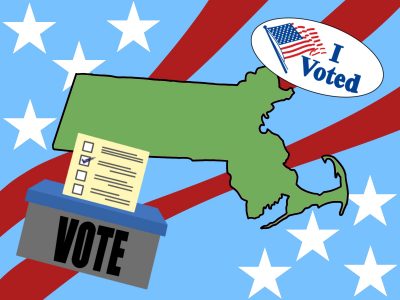Ballot questions, a key feature of voting in this year’s midterms, only come to fruition when the petitioner acquires enough signatures to prove the topic is important to the people — and this part of the midterm elections arguably affect day to day life more immediately than elections held at the national level.
In establishing the importance of voting on such issues, The Daily Free Press Editorial Board has chosen to endorse the following answers to each of the four questions on the ballot for the midterm elections.
Question 1: Additional tax on income over $1 million
This proposed amendment would establish an additional 4% state income tax on those whose annual taxable income exceeds $1 million. It’s important to emphasize the $1 million minimum as the question’s opponents fall into two categories — the megarich and the confused middle classmen.
The aspiration for current and prospective millionaires to cling tight to their bundles of cash is understandable, but as trickle down economics has far been disproven, such a tax is the easiest way to ensure their surplus of income benefits all.
Voting “yes” could increase annual state revenues by $1.2 billion. This would go towards public education as well as improving transportation infrastructure — hopefully providing the necessary funds to aid Mayor Michelle Wu’s initiative to make MBTA transit free for all.
Our vote: YES
Question 2: Regulation of dental insurance
Unlike health insurance plans, no laws exist to maintain the ratio of money dentist offices put towards patient care rather than administrative expenses.
In 2019, Massachusetts’ Delta Dental spent $382 million on executive bonuses, commissions and payments to affiliates, putting only $177 million toward patient care.
The proposed law is a bit confusing when read through, but essentially, voting yes would ensure the maintenance of your pearly whites is the primary expenditure of dental companies, rather than paying for your dentist’s third trip to Cabo this year.
A common argument proposes this change would raise premiums (monthly payments) for insurance customers. However, the Milliman Report — the evidence which supposedly supports such a claim — has been misrepresented by opponents of this law, therefore no premium increase is likely.
Our vote: YES

Question 3: Expanded availability of licenses for the sale of alcoholic beverages
Question 3 would guarantee equitable alcohol standards for both big and small businesses by gradually increasing the amount of different alcohol sales licenses a business can maintain, with the maximum eventually reaching 18 by 2031.
The proposed law is a compromise, as this maximum number prevents large chain stores from acquiring an unlimited amount of licenses.
If big box stores are allowed to accumulate licenses to sell all types of alcohol at all their locations, consumers will abide by convenience — shopping at their local grocery store chains for alcohol rather than going out of their way to a package store, whose smaller business is dependent purely on alcohol sales.
On top of this, voting yes would alter the penalty for serving underage or intoxicated individuals to be based on the gross profits on all retail sales rather than solely alcohol sales — as basing it purely on alcohol acts as a disadvantage to liquor stores whose sales don’t include other groceries.
Our Vote: YES
Question 4: Eligibility for Driver’s Licenses
Currently, there is a law that would take place in 2023 which allows Massachusetts residents who cannot prove they’re legal citizens in the United States to obtain a driver’s license or learner’s permit as long as they meet the other necessary qualifications and provide some form of identification. This question has been brought up in hopes to repeal said law.
The thought process behind the repeal is a part of an effort to prevent “voter fraud,” as it’s thought the driver’s license could act as an official identification and allow people who are not legally living in the U.S. to vote in the country’s elections.
Despite this thinking, it has been proven that the voter fraud issue has been conflated beyond its true magnitude. In fact, voter fraud is extremely rare. As an example, only 4 voter fraud cases were reported in the 2016 election out of the 136 million votes cast.
The myriad of solutions the law resolves far outweigh this debunked paranoia.
By allowing everyone to obtain driver’s licenses regardless of citizenship status, people won’t be driving without having taken the necessary road exams — thus preventing accidents, and more specifically hit and runs.
On top of that, when accidents do occur, those at fault will have access to car insurance, for which a driver’s license is required. This ensures all parties on the road are covered for damages.
Voting yes prioritizes safety above all else and proposes all people within the country, regardless of citizenship status, are deserving of respect, rather than the othering and racist undertones purported by a possible repeal.
Our vote: YES
Voting yes on this upcoming election’s ballot questions is a vote for the people and small businesses who too often are dismissed as an afterthought. A yes today will secure a hopeful tomorrow.
This editorial was written by Opinion Editor Lydia Evans.





















































































































